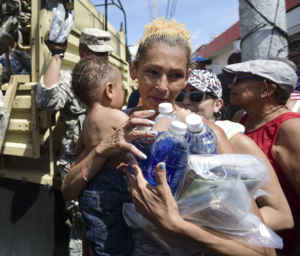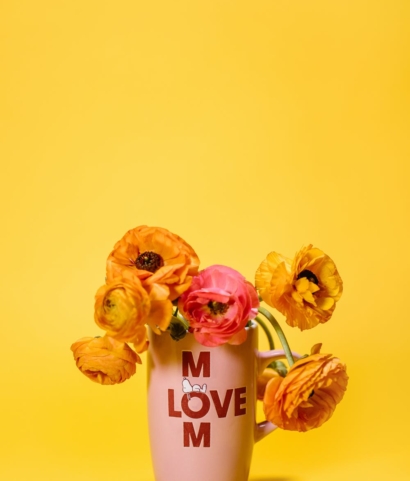Puerto Rico – A Formula for Tragedy
Water and electricity? Growing up my mom always said that the modern convenience she’d most hate to lose is running water. Of course, it’s a close race with electricity, and for most of us, both have quickly become staples that we rely on every day. It’s easy to get used to perceived necessities, like diapers (see article), and it’s painfully obvious when they are hard to get.
 Now, Puerto Ricans (i.e., our fellow Americans) need something even more desperately than diapers: clean water. Not even running water, just water. The first thing I think of when I hear of water being contaminated because of natural disasters is infants who are not breastfed because, formula, as we all know, requires sterilized (or at the very least uncontaminated) water.
Now, Puerto Ricans (i.e., our fellow Americans) need something even more desperately than diapers: clean water. Not even running water, just water. The first thing I think of when I hear of water being contaminated because of natural disasters is infants who are not breastfed because, formula, as we all know, requires sterilized (or at the very least uncontaminated) water.
In some circles of middle-class motherhood in the U.S., the mommy wars center less on work and more on whether a woman chooses to breastfeed. Over the past two years, I’ve interviewed nearly 100 women, and not a single one failed to mention how fraught the issue of breastfeeding was, particularly when going back to work. A friend of mine wrote a great piece in which she confesses to bottle-feeding the way some would admit to putting down the family dog for entertainment. But this is (mostly) white, middle-class motherhood – the face we see most often in the media. As with most things, the experience of motherhood very much relies on one’s class and race.
The following is from the CDC:
|
Ethnicity |
Initiated Breastfeeding |
Breastfed exclusively at 6 mo |
|
White |
82% |
22% |
|
Black, non Hispanic |
64% |
17% |
|
Hispanic |
81% |
26% |
African-Americans have received the most scrutiny for low breastfeeding rates. Puerto Rican mothers largely escape this scrutiny in part because Mexican mothers breastfeed quite often thereby raising the overall percentages for Hispanic/Latina women. When Puerto Rican women are isolated, their percentages are quite low – 72% report breastfeeding at least once while in the hospital, with only 29% breastfeeding exclusively. At the 6-month point, only 33% of mothers were still breastfeeding and only 55% of these babies (so roughly 16% of all babies) were breastfeeding exclusively.
Under normal circumstances, the CDC would like to see these numbers go up, but right now there is an immediate crisis. According the Kaiser Family Foundation, 31,000 lives birth occurred in Puerto Rico in 2015. Presuming not much has changed in 2016-17, we can estimate that approximately 15,000 babies are age 0-6 months in Puerto Rico right now, with most of them relying on sterilized water and formula to meet their critical nutritional needs – water that is in very short supply.
It is easy to judge the choices of poor mothers. Breastfeeding, after all, is free, and with 70-90% of new mothers in Puerto Rico receiving assistance from WIC (and WIC listing formula as their single largest expense) one could argue that if these women chose the more fiscally responsible option the immediate crisis would be slightly mitigated. That fails to see how race and class are two key determinants that shape the choices made by new mothers in Puerto Rico.
The first determinant is cultural: According to pediatrician Yvette Piovarnetti “the image of the healthy chubby baby is well-ingrained in the Hispanic culture,” insinuating that breastfed babies, even while being sufficiently nourished, may not gain the same amount of weight. Piovarnetti also claims that the Puerto Rican culture is matriarchal when it comes to child-rearing and new mothers emulate what their own mothers had done. The second is economic: Many financially insecure women experience less stable employment and must return to work quickly since the U.S. does not offer paid maternity leave. These factors make breastfeeding difficult.
For women who do not breastfeed for any number of reasons and for babies with allergies, formula is a literal life-saver. And, at this moment, thousands of infants need life-saving as they are in desperate need of clean water. Instead, they (along with their families and communities) are once again suffering as a result of their class and the color of their skin. Unlike Texas and Florida, where channels, although strained, were established to help deliver necessities, many great non-profits are waiting with ample donations ready to be delivered, but little can be done without travel channels being opened.
Water may still be days out as a result of the White House’s reluctance to make timely and reasonable concessions to antiquated maritime rules and it continues to deal with Puerto Rico like an enemy with which we have had a long-standing feud. (Though one would hope we would treat innocent civilians in a country we didn’t like better than the cold shoulder Puerto Rico has received.) While the media’s consistent depiction of the literal face of motherhood being white and financially secure does not help, much more of the blame rests squarely on our current Administration as it continues to ignore pleas from stateside Americans and Puerto Ricans alike to give aid.
Perhaps Mr. Trump has had little exposure to the furious, anxious wails of a hungry baby. After all, he claimed he has never changed a diaper and kicked a baby out of a rally for crying. Articles like this one often end with a way to solve the problem, but unfortunately, I have few strong suggestions. However, in the spirit of John Oliver, I can suggest that all parents of young babies should call the White House (202-456-1111) during their little one’s next meltdown so s/he can wail to his/her heart’s content. Maybe then Mr. Trump will hear the cries for help.
